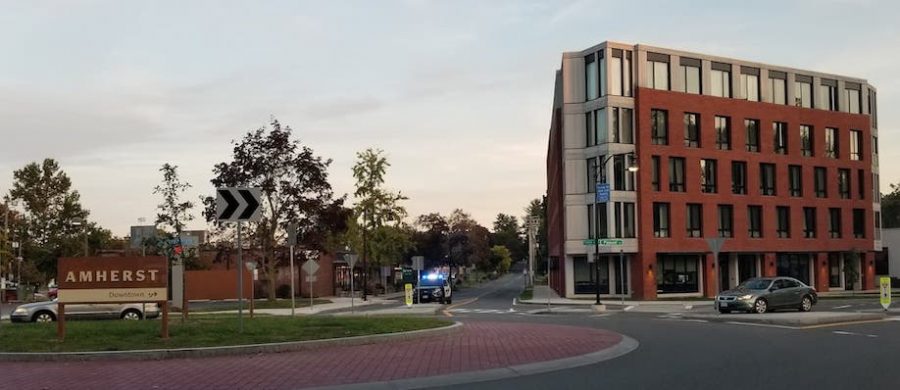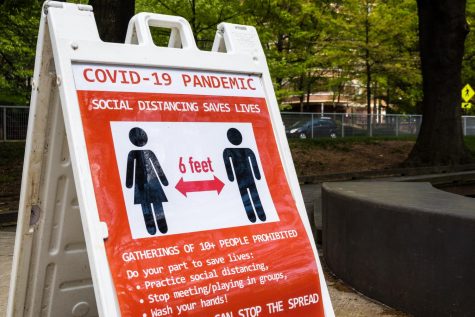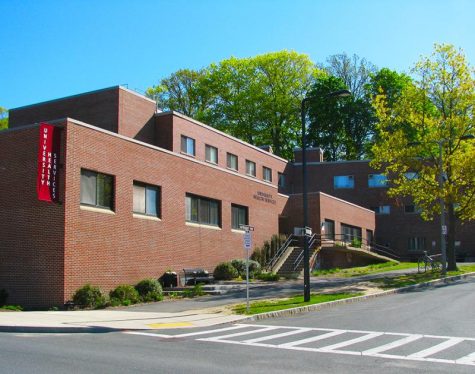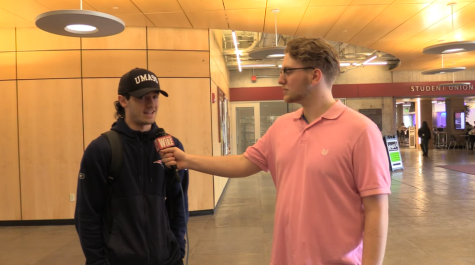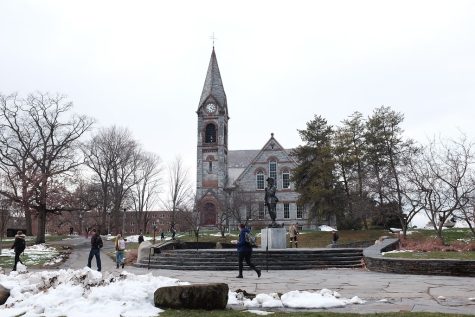Virtual community forum held to discuss UMass and Town efforts to reduce spread of COVID-19
Panelists discussed plans for spring semester, resources for students who test positive and more
With the number of COVID-19 cases rising at universities across the country, officials from UMass and the Town of Amherst held a virtual community forum on Sept. 3 to discuss how they are working to reduce the spread of COVID-19.
The forum featured panelists who answered questions that were previously submitted by attendees via Google Form. Panelists included Amherst Town Manager, Paul Bockelman, Amherst Chief of Police, Scott Livingstone, Public Health Nurse, Ann Becker, and Associate Dean of Students of Off-Campus Student Life and Community Engagement, Sally Linowski, among others. The forum began at 5:30 p.m. and lasted one hour.
Here are the questions that were answered at the forum:
Q: What is your current plan for the spring semester?
“We know we need to protect the community’s public health by limiting the potential transmission from asymptomatic individuals to other community members who may be at greater risk for more severe symptoms. Much of what we are planning for the spring will depend on how good of a job all of us do this semester: keeping down the number of people at gatherings, social distancing, and promoting wearing face coverings.” – Steve Goodwin, Deputy Chancellor
Q: Will UMass commit to asymptomatic periodic testing of all students residing in Amherst, not just the ones in the face-to-face classes or on campus working in research labs? Can you give an update on the current COVID-19 testing activity?
“Over the last seventeen days, we’ve performed nearly 20,000 tests. This represents 8,000 unique individuals living in our community who have been tested at least once. In that 8,000, there are just over 1,000 students living on campus who have been tested, and there are 7,000 students, staff and faculty who are living off-campus in our community who have also been tested. Students living on campus have been tested three times so far, and the students living off-campus have been tested twice, and will be asked to test again this week. A public health response team that includes members of University Health Services, environmental and health safety, epidemiologists on-campus, and the public health nurse meets daily and examines those testing results and then makes recommendations to the Vice Chancellors and the Chancellor.” – Steve Goodwin, Deputy Chancellor
Q: Are molecular tests or rapid antigen tests being done?
“We’re doing molecular RT-PCR tests.” – Ann Becker, Public Health Nurse
Q: If a college student living in Amherst tests positive for COVID-19, will they be counted as an Amherst case?
“We’ve been working hard to mitigate this problem at UMass. We do three different things: first, in the Community Agreement, we requested all students to update their local address in Spire. Second, every time we test a student when they come in through the Public Health Promotion Center, we ask them their local address is. Third… we work closely with the Massachusetts Department of Public Health. They’re aware of this problem in every college and university and they rapidly redirect any cases back to us for follow-up.” – Steven Goodwin, Deputy Chancellor
Q: If an off-campus student tests positive, how does the university provides support to that student?
“At UMass, when an individual student, faculty or staff member that’s associated with the university tests positive for COVID-19, we have a team of UMass public health nurses who will quickly contact them and start a case investigation. That includes contact tracing and also a needs assessment… to help them be as successful as possible and carrying out the restrictions that are needed to be in isolation. It’s not easy for people going through this, so we help them to access physical or mental health care, we provide daily wellness calls to make sure they have food and medications, and we connect them to either academic or workplace support systems.” – Ann Becker, Public Health Nurse
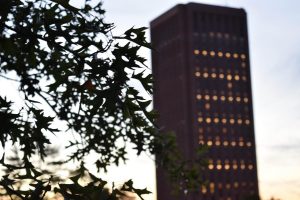
Q: Is UMass testing waste water for evidence of COVID-19?
“Amherst and faculty in the Department of Civil Engineering have been doing initial preliminary testing. We think we would be in a position in a few weeks to start to use some of that testing as a supplement [for the] direct testing of individuals that we’re doing.” – Steven Goodwin, Deputy Chancellor
Q: Will the Community Agreement be rewritten to warn students that not wearing masks in public and hosting or attending parties are grounds for suspension?
“The UMass Community Agreement was designed to help students understand how different life is as we’re experiencing college and COVID. It also brought attention to the expectations that we would hold them to as an institution. So our agreement was developed to be a social contract and to kick off our educational campaign. I think what folks are really more interested in is compliance, and when we think about compliance on campus, our code of Student Conduct is what gives us the necessary tools to follow up on any reports of misconduct or to hold students responsible for repetitive irresponsible behavior. That can include suspension as an option. If a student is non-compliant with wearing a mask we wouldn’t necessarily jump to suspension, but we would absolutely want to have a conversation and talk about their choices and figure out what’s going on there.” – Brandi Hephner LaBlanc, Vice Chancellor of Student Affairs & Campus Life
Q: What should I do when I see a group of people not social-distancing or wearing masks together?
“We set up a COVID Concern Number, (413) 259-2425, and an email address, [email protected]. The number is answered during the course of business hours and is checked seven days a week. It’s monitored all the time and we follow up with every call and every email. We started this last week and have gotten over 40 calls.” – Paul Bockelman, Amherst Town Manager
Q: Will students who test positive isolate at UMass or be sent home?
“UMass has designated isolation spaces on campus, so [students who test positive] will not stay in residence halls with other students. We have a dedicated space and team to help manage and support these students who are in isolation. Off-campus students are also offered that. Some do choose to go home… if they can drive there. We certainly don’t allow any public transportation or anything of that nature.” – Ann Becker, Public Health Nurse
Q: What steps has Amherst taken to correct the gaping holes among its own community members, especially about wearing masks and social distancing?
“Before students even started coming back, The Board of Public Health passed the mask law in the downtown area, and some of that was because we started seeing adult groups. gathering when they weren’t wearing masks. Amherst has put up a website and it has current information and resources on it. We have consistently, through our state representative and state senator, asked for a testing site in Amherst so that there would be one in Hampshire County, which there is not. However, there are sites that you can go to for testing in the area, and we make sure people know about those.” – Lynn Griesemer, President, Amherst Town Council
Q: Why are police often seen not wearing masks at construction sites with several town employees also not wearing masks?
“We do have an officer who’s dedicated to the downtown business district. He works a regular shift from 8:00-4:00 pm. As far as officers not wearing masks on construction sites, if the construction site is in downtown, in our mandated area, they would have to wear masks. [In other areas], there isn’t a mandate [for them to wear a mask] as long as they can social distance and follow the protocols that are set forth by our Board of Health and by the governor’s mandate.” – Scott Livingstone, Amherst Chief of Police
Q: Can UMass provide some outside dining spots or social activities on campus?
“In addition to those [chairs and dining spots] that existed before the spring semester, we’ve also placed about 50 Adirondack chairs on the Commonwealth Honors College grass lawn areas and moved all of the Sylvan outdoor furniture down to North so those students had some more outdoor space.” – Brandi Hephner LaBlanc, Vice-Chancellor of Student Affairs & Campus Life
Email Rebecca at [email protected] or follow her on Twitter @Rebecca_Duffy_
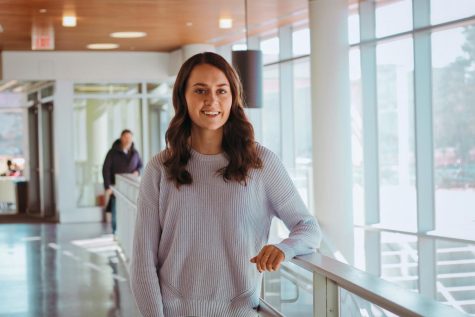
Email Rebecca at [email protected] or follow her on Twitter @Rebecca_Duffy_
"Aspire to inspire before you expire." - Eugene Bell Jr.

